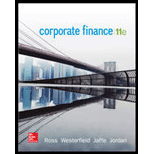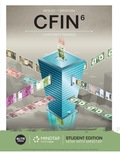
Concept explainers
a.
To determine: The
annually.
Future Value:
The value of assets on future based on some assumed growth rate at a specific period is termed as future value. It refers to the amount that is to be received in future on an investment with some returns on it after a specific period of time.
a.
Explanation of Solution
Given,
The amount to be invested today is $1,000.
Rate of interest is 7.5% per annum compounded annually.
Number of years is 6 years.
The formula to compute the future value is,
Where,
- FV is the future value.
- PV is the
present value . - r is the rate of inflation.
- n is the number of years.
Substitute $1,000 for PV, 7.5% for r and 6 for n in the above formula.
The future value when interest is compounded annually is $1,543.30.
Thus, the future value when interest is compounded annually is $1,543.30.
b.
To determine: The future value of $1,000 at 7.5% interest compounded semiannually.
b.
Explanation of Solution
Given,
The amount to be invested today is $1,000.
Rate of interest is 7.5% per annum compounded semiannually.
Number of years is 6 years.
The formula to compute the future value when interest is compounded semiannually is,
Where,
- FV is the future value.
- PV is the present value.
- r is the rate of inflation.
- n is the number of years.
Substitute $1,000 for PV, 7.5% for r and 6 for n in the above formula.
The future value when interest is compounded semiannually is $1,555.45.
Thus, the future value when interest is compounded semiannually is $1,555.45.
c.
To determine: The future value of $1,000 at 7.5% interest compounded monthly.
c.
Explanation of Solution
Given,
The amount to be invested today is $1,000.
Rate of interest is 7.5% per annum compounded monthly.
Number of years is 6 years.
The formula to calculate the future value when interest is compounded monthly is,
Where,
- FV is the future value.
- PV is the present value.
- r is the rate of inflation.
- n is the number of years.
Substitute $1,000 for PV, 7.5% for r and 6 for n in the above formula.
The future value when interest is compounded monthly is $1,566.12.
Thus, the future value when interest is compounded semiannually is $1,555.45.
d.
To determine: The future value of $1,000 at 7.5% interest compounded continuously.
d.
Explanation of Solution
Given,
The amount to be invested today is $1,000.
Rate of interest is 7.5% per annum compounded monthly.
Number of years is 6 years.
The formula to calculate the future value when interest is compounded continuously is,
Where,
- FV is the future value.
- PV is the present value.
- r is the rate of inflation.
- n is the number of years.
- e is used for exponential
Substitute $1,000 for PV, 7.5% for r and 6 for n in the above formula.
The future value when interest is compounded continuously is $1,568.31.
Thus, the future value when interest is compounded continuously is $1,568.31.
e.
To explain: The reason of increase in future value with the decrease in compounding period.
e.
Explanation of Solution
The reason of increase in future value as the compounding period shortens is the regularity of the interest earned.
The main reason that the compounding period is shorter is that the interest is earned on the previously held accrued interest. Interest will be more and future value will be greater when the compounding period shortens.
- Shorter compounding period will lead to more regular receipt of interest.
- The increase in regularity of interest will increase the value of interest earned and that will increase the future value as a whole.
Thus, the reason of increase in future value as the compounding period shortens is the regularity of the interest earned.
Want to see more full solutions like this?
Chapter 4 Solutions
Corporate Finance (The Mcgraw-hill/Irwin Series in Finance, Insurance, and Real Estate)
- Present Value of Amounts Due Assume that you are going to receive $440,000 in 10 years. The current market rate of interest is 11%, compounded annually. a. Using the present value of $1 table in Exhibit 5, determine the present value of this amount compounded annually. Round to the nearest whole dollar. b. Why is the present value less than the $440,000 to be received in the future? The present value is less due to the compounding of interest inflation the compounding of interest deflation over the 10 years.arrow_forwardWhat rate of interest compounded annually is involved if:arrow_forwardFind the accumulated value of an investment of $15,000 for 4 years at an interest rate of 4.5% if the money is a. compounded semiannually; b. compounded quarterly; c. compounded monthly d. compounded continuously. Round answers to the nearest cent. a. What is the accumulated value if the money is compounded semiannually?arrow_forward
- What is the future value of $118,000 invested for 5 years at 11% compounded monthly? (a) State the type. A. ordinary annuityB. present value C. amortizationD. sinking fundE. future value (b) Answer the question. (Round your answer to the nearest cent.)arrow_forwardQuestion 1 What is the future value of $650 deposited for one year earning an 10 percent interest rate annually? (Do not round intermediate calculations. Enter your answer as a whole number.) Future valuearrow_forwardWhat are the future value and the interest earned if $2800 is invested for 3 years at 8% compounded quarterly? (Round your answers to the nearest cent.) future value $ interest earned $arrow_forward
- What is the present value (PV) of an investment that pays $90,000 every year for four years if the interest rate is 9% APR, compounded quarterly? O A. $347,535 B. $318,574 OC. $376,496 O D. $289,613arrow_forwardFind the accumulated value of an investment of $10,000 for 3 years at an interest rate of 5.5% if the money is a. compounded semiannually; b. compounded quarterly; c. compounded monthly d. compounded continuously. Round answers to the nearest cent. a. What is the accumulated value if the money is compounded semiannually? (Round your answer to the nearest cent.)arrow_forwardCalculate the future value in five years of $5,000 received today if your investments pay. 6 percent compounded annually 8 percent compounded annually 10 percent compounded annually 10 percent compounded semiannually 10 percent compounded quarterly What do your answers to these questions tell you about the relation between future values and interest rates and between future values and the number of compounding periods per year?arrow_forward
